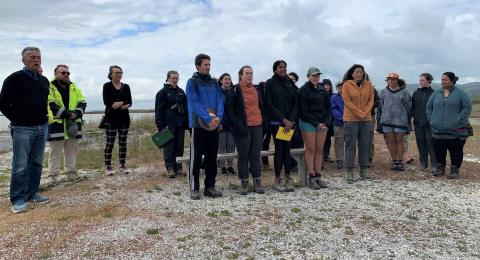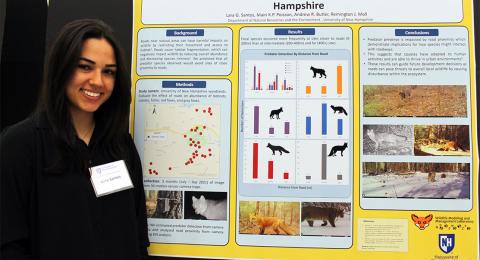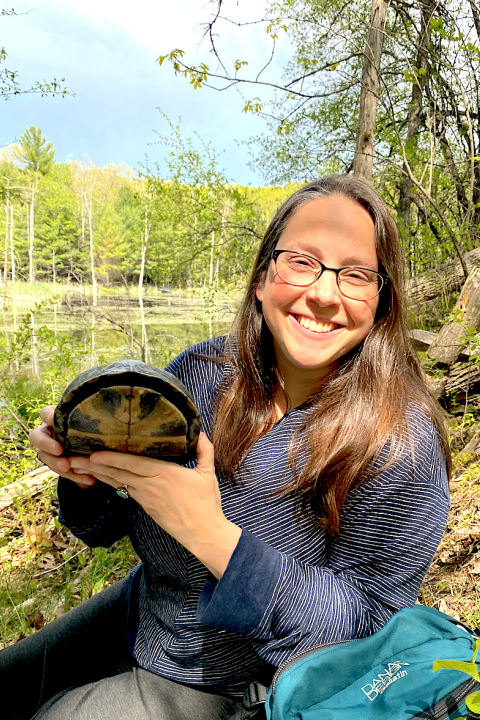About the Environmental Conservation and Sustainability program
The Environmental Conservation and Sustainability major at UNH prepares you to address pressing environmental challenges. You will benefit from experience-based learning, research opportunities and field experiences that deepen your understanding of ecological principles. This major appeals to students passionate about protecting the environment, advocating for sustainability and working towards a greener future and is ideal for those who enjoy problem-solving, and interdisciplinary studies,
Students study environmental conservation and sustainability because they share a vision of a future where people live with respect for the Earth’s natural systems and each other. This program provides a solid foundation in environmental science, ecology, economics, policy, and communications. Students examine the impacts of human activity on the environment, learn the principles of sustainability, and gain a deep understanding of the complex relationships in the natural environment. As students progress through their studies, they develop a customized focus area tied to an environmental issue, ecological system or natural resource.
Why study environmental conservation and sustainability at UNH?
Our graduates are sustainability advocates and leaders for constructive change. They have the knowledge and skills to solve real-world problems while working collaboratively with diverse interest groups. They become facilitators of change toward a sustainable future. Many students pursue international experiences,such as UNH’s EcoQuest program in New Zealand, add a minor, or pursue research opportunities with our faculty or through UNH's undergraduate research programs.
Potential careers
- Advocacy and regulatory affairs
- Conservation management
- Land-use analysis
- Natural resources management
- Environmental education and outreach
- Environmental consulting
- Sustainability management
Curriculum & Requirements
The ECS major curriculum is comprised of core requirements providing integrative courses in both environmental conservation and sustainability, along with a foundation in biology, ecology, physical and social science, and the basic tools and skills applied to problem solving. These core requirements are typically fulfilled in the first two years. Beginning in their junior year, ECS students, in consultation with their advisers, create a course focus area based on an ecological system or natural resource of their choosing. The focus area provides advanced study in ecology and natural resources; social sciences; tools, skills, and/or natural history and should reflect the student's interests and future goals. Additionally, each ECS student completes a practicum experience and a capstone option.
The ECS major provides the opportunity for students to gain a common foundation of knowledge and skills emphasizing integration and critical thinking, while allowing for sufficient flexibility to pursue their interests and passions within a large and complex field of study. The design of the curriculum will allow each student at least four, and as many as six, free electives, which they may fulfill as they choose. Many students pursue international experiences, such as the UNH EcoQuest program in New Zealand, add a minor or dual degree (such as the dual degree in global studies), and/or pursue research opportunities with our faculty or through another of UNH's undergraduate research opportunity programs.
Sample Degree Plan
This sample degree plan serves as a general guide; students collaborate with their academic advisor to develop a personalized degree plan to meet their academic goals and program requirements.
| First Year | ||
|---|---|---|
| Fall | Credits | |
| BIOL 412 | Introductory Biology: Evolution, Biodiversity and Ecology (Inquiry, Disc BS) | 4 |
| NR 435 | Contemporary Conservation Issues and Environmental Awareness (Disc ETS) | 4 |
| NR 411 | Environmental and Resource Economics Perspectives (or Discovery Course, not SS or ETS) | 4 |
| ENGL 401 or Discovery Course | 4 | |
| Credits | 16 | |
| Spring | ||
| NR 437 | Principles of Sustainability | 4 |
| NR 439 | Environmental Biology | 4 |
| NR 411 | Environmental and Resource Economics Perspectives (or Discovery Course, not SS or ETS) | 4 |
| ENGL 401 or Discovery Course | 4 | |
| Credits | 16 | |
| Second Year | ||
| Fall | ||
| NR 415 | Natural Resources Field Methods | 2 |
| Ecological Principles 1 | 4 | |
| Physical Science (Disc PS) 2 | 4 | |
| Presentation Skills (possible Disc FPA) 2 | 4 | |
| Practicum 3 | 0 | |
| Elective | 4 | |
| Credits | 18 | |
| Spring | ||
| Statistics (Disc QR) 2 | 4 | |
| Writing Skills (Univ. writing req.) 2 | 4 | |
| NR 658 | Introduction to Geographic Information Systems | 4 |
| NR 602 or Discovery Course | 4 | |
| Credits | 16 | |
| Third Year | ||
| Fall | ||
| NR 602 or Discovery Course | 4 | |
| Ethics/Values Requirement | 4 | |
| Focus Area Courses | 8 | |
OR Electives | ||
OR any remaining Discovery or WI requirement | ||
OR Capstone 4 | ||
| Credits | 16 | |
| Spring | ||
| Focus Area Courses 5 | 16 | |
OR Electives | ||
OR any remaining Discovery or WI requirements | ||
OR Capstone 4 | ||
| Credits | 16 | |
| Fourth Year | ||
| Fall | ||
| Capstone Requirement 5 | 2-4 | |
| Focus Area Courses | 12 | |
OR Electives | ||
OR any remaining Discovery of WI requirements | ||
| Credits | 14-16 | |
| Spring | ||
| Capstone Requirement 5 | 2-4 | |
| Focus Area Courses | 12 | |
OR Electives | ||
OR any remaining Discovery of WI requirements | ||
| Credits | 14-16 | |
| Total Credits | 126-130 | |
- 1
All choices for the Ecological Principles requirement except for AGFS 502 are fall courses.
- 2
The Statistics, Physical Science, Writing Skills and Presentation Skills requirements may be taken in either the Fall or Spring Semester of the second year.
- 3
Work experience, internship, etc may be scheduled any time beginning in the second year.
- 4
One of the 2 credit capstone seminars may be taken in either the fall or spring of the junior year.
- 5
One 2 credit seminar may be taken in each of the Fall and Spring semesters of the Senior Year OR NR 786 may be taken in the Fall semester of the Senior Year.
Degree Requirements
All Major, Option and Elective Requirements as indicated.
*Major GPA requirements as indicated.
Major Requirements
A minimum grade of C- is required in coursework for the major.
| Code | Title | Credits |
|---|---|---|
| Core Requirements | ||
| Foundational Courses: | ||
| NR 435 | Contemporary Conservation Issues and Environmental Awareness | 4 |
| NR 437 | Principles of Sustainability | 4 |
| Natural Science: | ||
| Biology: | ||
BIOL 412 | Introductory Biology: Evolution, Biodiversity and Ecology | |
NR 439 | Environmental Biology | |
| Ecological Principles: Select one of the following | 4 | |
BIOL 541W | Ecology | |
NR 527 | Forest Ecology | |
AGFS 502 | Agroecology | |
| Physical Science: Select one of the following | 4 | |
NR 403 | Introduction to Environmental Science | |
CHEM 403 | General Chemistry I | |
CHBE 410 | Energy and Environment | |
ESCI 409 | Geology and the Environment | |
CEE 520 | Environmental Pollution and Protection: A Global Context | |
PHYS 401 | Introduction to Physics I | |
| Social Science: | ||
| Resource Economics: | ||
NR 411 | Environmental and Resource Economics Perspectives | |
| Environmental Ethics and Values: Select one of the following | 4 | |
NR 784 | Sustainable Living - Global Perspectives | |
SOC 565 | Environment and Society | |
| Natural Resources Policy: Select one of the following | 4 | |
NR 602 | Natural Resources and Environmental Policy | |
NR 662 | Environmental Policy, Planning and Sustainability in New Zealand | |
| Essential Tools and Skills: | ||
| Field Methods: | ||
NR 415 | Natural Resources Field Methods | |
| Statistics: Select one of the following | 4 | |
BIOL 528 | Applied Biostatistics I | |
NR 525 | Statistical Methods and Applications | |
| Geospatial Analysis: | ||
NR 658 | Introduction to Geographic Information Systems | |
| Writing Skills: Select one of the following | 4 | |
ENGL 502 | Professional and Technical Writing | |
ENGL 503 | Persuasive Writing | |
| Presentation Skills: Select one of the following | 4 | |
NR 508 | Communicating Science | |
CMN 500 | Public Speaking | |
THDA 522 | Storytelling, Story Theatre, and Involvement Dramatics | |
THDA 583 | Introduction to Puppetry | |
THDA 624 | Theatre for Young Audiences | |
| Focus Area | ||
| Select seven total courses to create a focus area addressing an environmental issue, ecological system, or natural resource (see below) 1 | 28 | |
| Ecology and Natural Resources: | ||
| Select one to four courses: no more than one course may be at the 400 or 500 level. Additional courses must be at the 600 or 700 levels. | ||
ESCI 405 | Global Environmental Change | |
NR 433 | Wildlife Ecology | |
NR 501 | Studio Soils | |
NR 504 | Freshwater Resources | |
NR 640 | Wildlife Population Ecology | |
NR 642 | Introduction to Biogeography | |
NR 650 | Principles of Conservation Biology | |
NR 660 | Ecology and Biogeography of New Zealand | |
NR 661 | Restoration Ecology and Ecosystem Management in New Zealand | |
NR 663 | Applied Directed Research in New Zealand | |
NR 664 | Conservation Genetics and Applied Evolution | |
AGFS 671 | Agroecology and Sustainable Land Management in Aotearoa New Zealand | |
MEFB 628 | Marine Invertebrate Evolution and Ecology | |
MEFB 674 | Ecology and Marine Environment | |
AGFS 760W | Integrated Pest Management | |
MEFB 702 | Sustainable Marine Fisheries | |
MEFB 747 | Aquatic Plants in Restoration/Management | |
MEFB 755 | Biological Oceanography | |
MEFB 772 | Fisheries Biology: Conservation and Management | |
NR 706 | Soil Ecology | |
NR 730 | Terrestrial Ecosystems | |
NR 734 | Tropical Ecology | |
NR 743 | Addressing Arctic Challenges | |
NR 744 | Biogeochemistry | |
NR 751 | Aquatic Ecosystems | |
NR 761 | Environmental Soil Chemistry | |
NR 765 | Community Ecology | |
NR 782 | Forest Health in a Changing World | |
ZOOL 708 | Stream Ecology | |
ZOOL 726 | Conservation Behavior | |
| Social Sciences | ||
| Select two to five courses: no more than one course may be at the 400 or 500 level. Additional courses must be at the 600 or 700 levels. | ||
CEP 415 | Community Development Perspectives | |
TOUR 400 | Introduction to Tourism | |
CEP 508 | Applied Community Development | |
NR 507 | Introduction to our Energy System and Sustainable Energy | |
NR 572 | Introduction to Natural Resource Economics | |
AGFS 672 | Pathways to Sustainable Agriculture and Food Systems in Aotearoa New Zealand | |
AGFS 673 | Agricultural Production and Business Practice in Aotearoa New Zealand | |
AGFS 690 | Agricultural and Food Policy | |
CEP 614 | Fundamentals of Planning | |
CEP 627 | Community Economics | |
CEP 673 | Green Real Estate | |
ECON 605 | Intermediate Microeconomic Analysis | |
ECON 645 | International Economics | |
HIST 618 | American Environmental History | |
GEOG 673 | Political Ecology | |
NR 606 | International Energy Topics | |
NR 607 | Land Economics Perspectives: Uses, Policies, and Taxes | |
NR 608 | Economics of Sustainability | |
NR 643 | Economics of Forestry | |
NR 662 | Environmental Policy, Planning and Sustainability in New Zealand | |
SOC 665 | Environmental Sociology | |
ECON 706 | Economics of Climate Change | |
MARI 705 | Introduction to Marine Policy: Understanding US Ocean, Coastal and Great Lakes Policy | |
NR 708W | Environmental Economics | |
NR 724 | Resolving Environmental Conflicts | |
NR 756W | Rural and Regional Economic Development | |
NR 720 | International Environmental Politics and Policies for the 21st Century | |
NR 784 | Sustainable Living - Global Perspectives | |
NR 787 | Advanced Topics in Sustainable Energy | |
SOC 730 | Communities and the Environment | |
| Advanced Tools & Skills and Natural History | ||
| Select at least one course | ||
AGFS 670 | Systems Thinking: Land Use Capability and Sustainability in Aotearoa New Zealand | |
BIOL 752 | New England Mushrooms: a Field and Lab Exploration | |
CEP 777 | Topics in Community Planning | |
NR 425 | Field Dendrology | |
NR 703 | Watershed Water Quality Management | |
NR 707 | Environmental Modeling | |
NR 712 | Mammalogy | |
NR 713 | Quantitative Ecology | |
NR 729 | Silviculture | |
NR 745 | Forest Management | |
NR 749 | Forest Inventory and Modeling | |
NR 757 | Remote Sensing of the Environment | |
NR 759 | Digital Image Processing for Natural Resources | |
NR 760 | Geographic Information Systems in Natural Resources | |
NR 785 | Systems Thinking for Sustainable Solutions | |
NR 767W | Social Impact Assessment | |
SOC 601 | Methods of Social Research | |
ZOOL 542 | Ornithology | |
| Senior Capstone Options | ||
| The ECS major capstone experience may be filled by any one (1) of the following options: | 4 | |
Option 1: | ||
NR 786 | Leadership for Sustainability | |
Option 2: Both seminars must be scheduled. At least one must be taken in the senior year. | ||
NR 753 & NR 754 | Critical Issues in Sustainability: Sustainability as an Abundance Paradigm and Critical Issues in Sustainability: Sense of Place | |
Option 3: | ||
NR 663 | Applied Directed Research in New Zealand (NZ Directed projects, if taken in the senior year) 2 | |
Option 4: | ||
Directed projects fulfilling one of the following: NR 799, McNair Research Theses, Hamel Center Programs (IROP, SURF USA, SURF Abroad, etc.) may be applied in consultation with the adviser and ECS program coordinator. | ||
| Work Experience | ||
| NR 600 | Work Experience 3 | 0 |
- 1
The focus area is based upon at least one course in the ecology and natural resources category, along with a combination of courses in the social sciences; tools, skills, and natural history categories; and any additional courses from the ecology and natural resources category reflecting the student's interests and future direction. Focus areas should be designed in close consultation with the adviser. Courses used to fulfill core requirements may not be used in the focus area.
- 2
If NR 663 Applied Directed Research in New Zealand is taken in the junior year or earlier, then one Critical Issues seminar (2cr) or Leadership for Sustainability must be taken in the senior year to fulfill the capstone requirement.
- 3
Each ECS major will engage in a practical experience reflecting their interests and goals. The choice of the experience will be made in conjunction with the adviser and may occur any time beginning with the sophomore year.
Program Learning Outcomes
Students will be able to:
- Describe and explain the interactions among physical, biological, chemical, and human components of the environment;
- Formulate tests of environmental questions, acquire data, and apply scientific methods to answer these questions;
- Describe and explain the ecological and societal value of biodiversity, sustainability, and environmental stewardship;
- Use principles of ecology, economics, sustainability, and policy science to solve real-world environmental problems;
- Communicate effectively to peers within the environmental community and with audiences outside of the discipline.
Explore Program Details
Key Learning Objectives:
Students will be able to:
- Evaluate the validity and limitations of scientific theories and claims about the environment;
- Describe and explain the interactions among physical, biological, chemical, and human components of the environment;
- Formulate tests of environmental questions, acquire data, and apply scientific methods to answer these questions;
- Characterize the various social drivers of environmental problems and the relative attributes of policy instrument solutions;
- Locate, evaluate, and summarize print and electronic media including peer-reviewed literature and then compose and deliver informed positions on current environmental problems to the public.
- Describe and explain the ecological and societal value of biodiversity, sustainability, and environmental stewardship;
- Master mathematical, statistical, and study design knowledge and skills, and use state-of-the-art software, hardware, and analytical techniques relevant to environmental conservation and sustainability:
- Use principles of ecology, economics, sustainability, and policy science to solve real-world environmental problems;
- Communicate effectively to peers within the environmental community and with audiences outside of the discipline.
In what department and college does the Environmental Conservation and Sustainability (ECS) major reside?
The ECS major is part of the Department of Natural Resources and the Environment in the College of Life Sciences and Agriculture (COLSA) at UNH.
What other majors are in the Department of Natural Resources and the Environment?
There are six other majors in the Department in addition to the ECS major. They are Forestry, Wildlife and Conservation Biology, Environmental Science: Soil and Water, Environmental Science: Ecosystems, Environmental and Resource Economics, and Community and Environmental Planning.
Why should I major in Environmental Conservation and Sustainability?
ECS is a unique major in that it combines knowledge of the natural sciences with the human dimension. That is, there is also a large social science component where the student learns to deal with problem-solving, conflict resolution, policy analysis and other social aspects in order to have a real impact for the environment and sustainability.
What is required in the ECS major?
The ECS major has 14 core requirements (courses) that are a combination of (1) some foundational courses, (2) some natural science courses, (3) some social science courses, and (4) some skills and tools courses. There is also a seven-course Focus Area in which the student selects a specific topic (e.g., energy, forests, agriculture, economics, etc.) to gain more focused experience and deeper learning.
There is a senior capstone experience requirement (every major at UNH has some capstone experience) and a practicum/internship requirement. Finally, all UNH students must complete the university Discovery requirements (i.e., General Education).
How does a student decide on what classes to take?
Each student is assigned a faculty advisor who helps each student to select the right courses each semester to progress towards graduation. The Focus Area is also discussed with the advisor and planned accordingly.
What kind of jobs do ECS students get?
There are so many answers to this question. Some students go on to graduate school. Some get job offers from an employer they worked for during the summer. Many go on to short-time, paid internships to build their resume. There are many opportunities in the private sector, federal and state agencies, and non-governmental organizations.
Rigorous academic pursuit and hands-on learning from the mountains to the sea. Full immersion learning at a diversity of sites in the North and South Islands.
Xi Sigma Pi is facilitated through the UNH NREN department. Its goal is to unite likeminded individuals through service and fraternal spirit through a shared enjoyment of the environment. In addition, members receive recognition for their service by earning a cord to wear during graduation. Opportunities to take up leadership roles and give back to the NREN department are abundant.
Students interested in the Environmental Conservation and Sustainability major may also be interested in the following advanced degrees at UNH. Students in the program also have the opportunity to participate in the UNH accelerated master’s program.
Natural Resources and the Environment M.S.
Natural Resources: Ecosystem Science M.S.
Natural Resources: Environmental Conservation and Sustainability M.S.
Natural Resources: Environmental Economics M.S.
Natural Resources: Forestry M.S.
Natural Resources: Wildlife and Conservation Biology M.S.
Citizen and Community Science Graduate Certificate




















